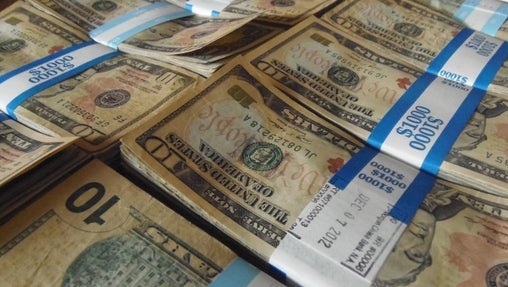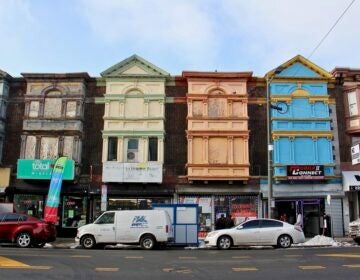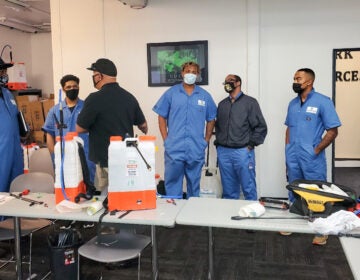Bank of Philadelphia? Study says a public bank could help small biz survive COVID
The city-commissioned study by HR&A Advisors suggests a public bank could help Philly tackle poverty and the COVID downturn.

$10 bills in US currency (AP Photo)
An independent report commissioned by the City of Philadelphia recommended the creation of a public bank that would allow city government to loan directly to small businesses.
The feasibility study done by consulting firm HR&A Advisors looked at how a city-controlled financial authority could help Philadelphia tackle entrenched poverty and open up financial opportunities to businesses historically locked out.
The 50-page report suggests that such a bank could allow America’s poorest big city to use $255 million in municipal deposits for local investments and also provide small business loans with the potential to generate returns between 1.42% to 1.46%.
HR&A estimates that there is a lending gap of at least $840 million for small businesses — those with less than 500 employees and firms with no paid employees — “that either applied for financing but did not receive it or were discouraged from seeking financing but may still have a funding shortfall.” This gap disproportionately affects Black and brown small businesses.
“While exploring the creation of a public bank, we hope that the City takes immediate and bold steps to support its Black and Latinx small businesses,” the report reads. “We hope that this study serves as a roadmap for making an immediate impact while laying the groundwork for systemic reform.
The pandemic, which hit Black and Latinx-owned businesses particularly hard in Philadelphia, added urgency to the need for the small business support that could come from a public bank, the report noted.
“Now more than ever, such a leadership role is required to direct capital to those businesses in light of the historic racial disparities evident in the commercial banking landscape,” the consultants wrote.
Should the city decide not to pursue a public bank, HR&A said the city can still provide much-needed help to its small business community by delivering loans to small businesses that aid in city priorities, issuing long-term loans that don’t require quick returns. The city could also incentivize private businesses to “participate in small businesses loans,” and leverage stable assets to attract private investment.
City Council’s Finance Committee will review the study in a public hearing scheduled for Monday, Oct. 5 at 1 p.m. Councilmember Derek Green, who chairs the committee, said the hearing will be an opportunity to bring his council colleagues up to speed.

Subscribe to PlanPhilly
“It will continue to give them an opportunity to ask questions that they may have but also provide an opportunity for the administration to provide their perspective as well as others who are advocates for this idea,” said Green, who has championed the idea of a public bank in Philadelphia as a tool to fight systemic racism and the city’s resulting racial wealth gap.
Public banks have critics too. President and CEO of the American Bankers Association Rob Nichols denounced the idea in an op-ed for The Philadelphia Inquirer, citing high startup costs and the system’s vulnerability to political pressure.
“A government bank, for example, could be incentivized to make questionable loans to politically connected borrowers, putting public funds at risk,” he wrote.
The Bank of North Dakota is the oldest example of a public bank in the United States. Money deposited in the 101-year-old bank comes from state taxes and fees and goes back out to the state’s general fund, loan programs that promote economic development and the bank’s own business funds. The bank even partners with private institutions to offer business and student loans to North Dakota residents.
A 2019 annual report showed the bank recorded its sixteenth year of record-breaking profits with $169 million and $7 billion in assets.
Establishing a public bank in Philadelphia would require state legislation, approval from the Pennsylvania Department of Banking and Securities, a city ordinance, and to act as a depository.
Peter Winslow, a member of the Philadelphia Public Banking Coalition, who helped with the report, said the study ought to expedite the process.
“Based on the feasibility study and other work that’s been done, it should be possible to move rapidly to the establishment of a bank.”
WHYY is your source for fact-based, in-depth journalism and information. As a nonprofit organization, we rely on financial support from readers like you. Please give today.







